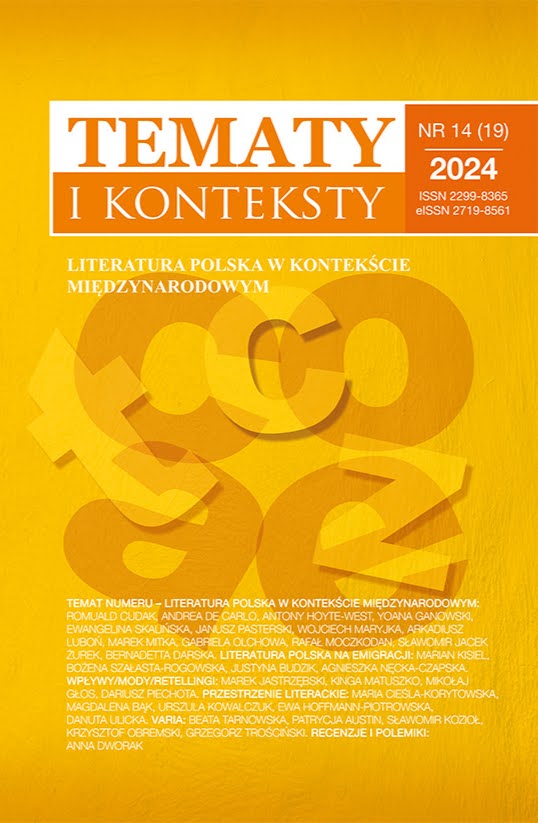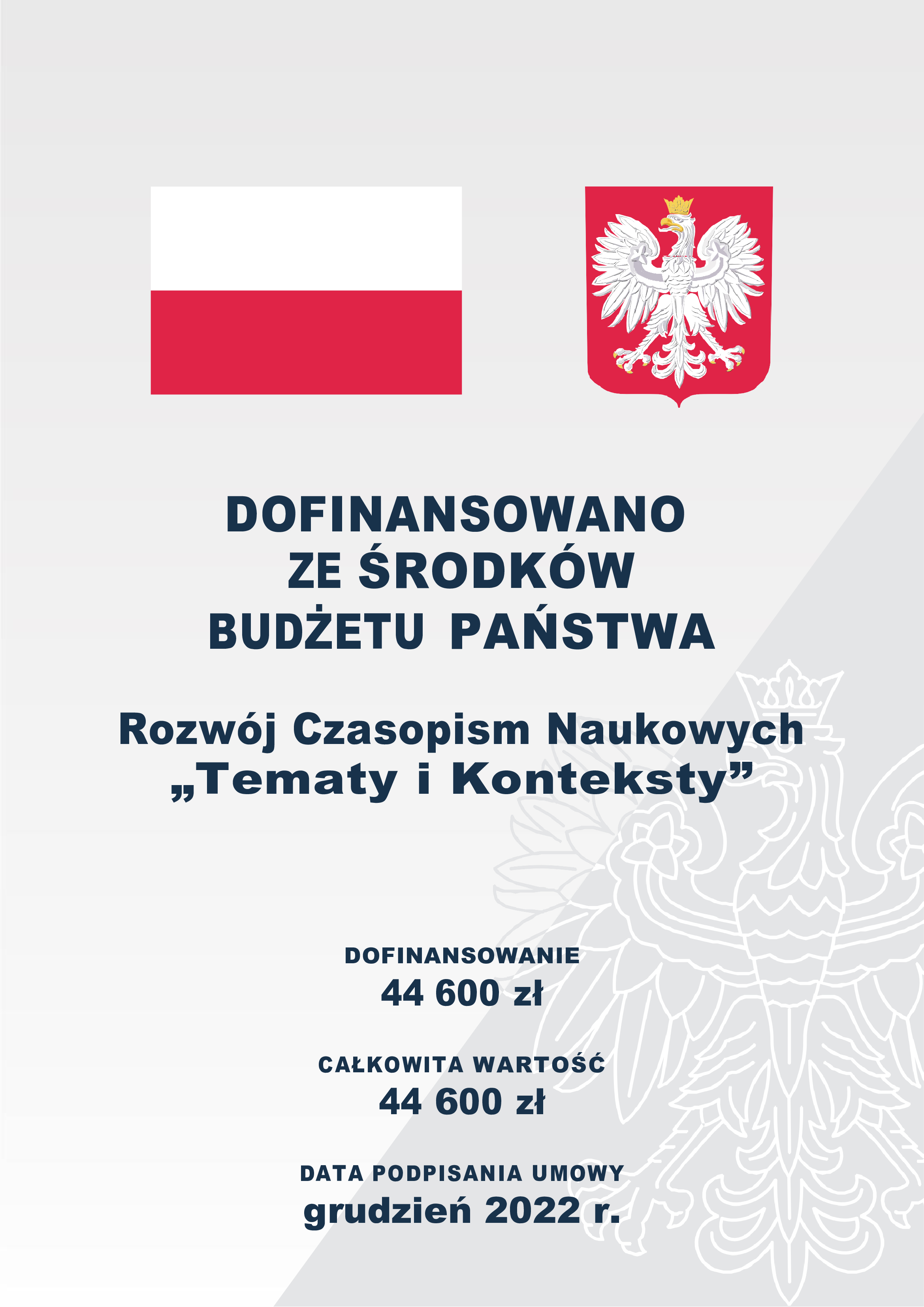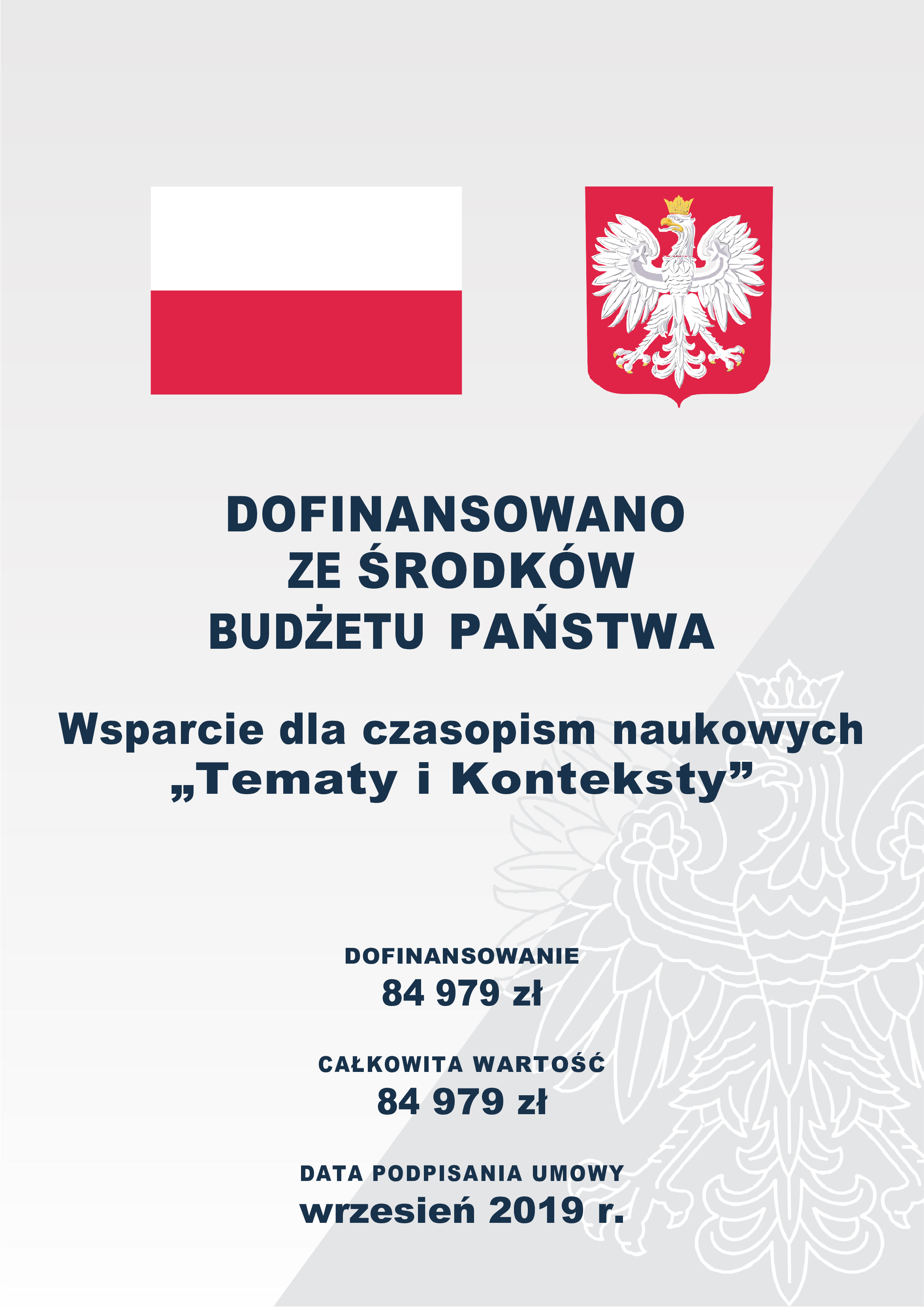Mythopoetic Fantasy: In Search of Harmony with the World. Metatheoretical Considerations that use the Example of Tolkien’s Arda
DOI:
https://doi.org/10.15584/tik.2024.18Keywords:
mythopoeic fantasy, homo religiosus, reductionism, materialism, mechanismAbstract
In the presented research, the author reflects on the prevalent opinion among literary critics regarding the escapism of mythopoetic fantasy. According to the article’s thesis, considering the specificity of the contemporary understanding of reality against which the alleged escapism of fantasy is directed, as well as the character of the narrative worlds of mythopoetic fantasy, the primary aim is not escapism but rather a pursuit of harmony with the world. Investigating the validity of this claim, the issues conditioning our contemporary understanding of the world are analysed. This is followed by a presentation of the literary universe of fantasy (primarily in the mythopoeic subgenre) understood as a form of rebellion: a rebellion not against reality itself, but against the modern perception of the world. Embracing Eliade’s concept of homo religiosus, the author concludes that mythopoeic fantasy seeks to enable contemporary humans to sacralise their perception of the reality as a means of retuning to the natural way of perceiving the universe inherent to the religious nature of humanity. The article concludes that the purpose of mythopoeic fantasy is to seek harmony with the world rather than escaping from it.
Downloads
References
Attebery Brian, The Fantasy Tradition in American Literature: from Irving to Le Guin, Indiana University Press, Bloomington 1980.
Attebery Brian, Stories about Stories: Fantasy and the Remaking of Myth, Oxford University Press, New York 2014.
Attebery Brian, Strategies of fantasy, Indiana University Press, Bloomington and Indianapolis 1992.
Brawley Chris, Nature and the Numinous in Mythopoeic Fantasy Literature, McFarland & Company, Jefferson 2014.
Day David, A Guide to Tolkien’s World. A Bestiary, Bounty Books, London 2012.
Dennett Daniel, Freedom Evolves, Penguin, London 2004.
Derdziński Ryszard, Pasterze Drzew, czyli enty, „Simbelmynë” no. 20, summer 2004, pp. 45-52.
Descartes René, Treatise on Man, translated by Thomas Steele Hall, Harvard University Press, Cambridge 1972.
Eliade Mircea, Claude-Henri Rocquet, L’épreuve du labyrinth: entretiens avec Claude-Henri Rocquet, Belfond, Paris 1978.
Eliade Mircea, The Quest. History and Meaning in Religion, The University of Chicago Press, Chicago and London 1984. DOI: https://doi.org/10.7208/chicago/9780226159379.001.0001
Eliade Mircea, The Sacred and the Profane: the Nature of Religion, Translated by Willard R. Trask, Harper & Brothers, New York 1961.
Hobbes Thomas, Leviathan, ed. Edwin Curley, Hackett Publishing Company, Indianapolis, Cambridge 1994.
Howard Robert E., The Complete Chronicles of Conan, Gollancz, London 2006.
Jastrzębski Marek, Wczesna filozofia grecka jako archeiczna droga do nieśmiertelności, Niepaństwowa Wyższa Szkoła Pedagogiczna w Białymstoku, Białystok 2014.
Jastrzębski Marek, Shambhala: magiczny raj Wschodu w literaturze Zachodu. Wstępne rozpoznanie, „Inskrypcje. Półrocznik” R. X 2022, z. 2 (19), pp. 9-18.
J.R.R. Tolkien Encyclopedia. Scholarship and Critical Assessment, ed. Michael D.C. Drout,
Routledge, New York, London 2007.
Lewis Clive S., The Chronicles of Narnia, HarperCollins, London 1998.
Manlove Colin N., Modern Fantasy: Five Studies, Cambridge University Press, Cambridge 1978.
Olson Carl, The Theology and Philosophy of Eliade, Macmillan, London and Basingstoke: Macmillan 1992. DOI: https://doi.org/10.1057/9780230378926
Oziewicz Marek, One Earth, One People: The Mythopoeic Fantasy Series of Ursula K. Le Guin, Lloyd Alexander, Madeleine L’Engle and Orson Scott Card, McFarland, Jefferson, North Carolina, and London 2008.
Rabkin Eric S., The Fantastic in Literature, Princeton University Press, Princeton, Guildford 1976.
Reale Giovanni, Storia della filosofia antica, vol. V, “Lessico, indici e bibliografia”, Università Cattolica, Milan 1989.
Rega Artur, Człowiek w świecie symboli. Antropologia filozoficzna Mircei Eliadego, Zakład Wydawniczy NOMOS, Kraków 2001.
Shippey Tom A., J.R.R. Tolkien. Author of the Century, Houghton Mifflin Company, Boston and New York 2002.
Stasiewicz Piotr, Między światami. Intertekstualność i postmodernizm w literaturze fantasy. Wydawnictwo Uniwersytetu w Białymstoku, Białystok 2016.
Tolkien Christopher, The History of Middle-earth. Volume V. The Lost Road and other Writings. Language and Legend before The Lord of the Rings, Ballentine Books, New York 1996.
Tolkien Christopher, The History of Middle-earth. Volume VI. The Return of the Shadow. The history of the Lord of the Rings. Part One, Houghton Mifflin, Boston, New York 1988.
Tolkien John R.R., Silmarillion, HarperCollins, London 2013.
Tolkien John R.R., The Fellowship of the Ring. Being the First Part of The Lord of the Rings, HarperCollins London 2001.
Tolkien John R.R., Carpenter Humphrey, Tolkien Christopher, The letters of JRR Tolkien, Houghton Mifflin, Boston 1981.
Tolkien J.R.R., The Return of the King. Being the Third Part of The Lord of the Rings, HarperCollins, London 2001.
Tolkien J.R.R., The Two Towers. Being the Second Part of The Lord of the Rings, Harper-Collins, London 2001.
Tolkien John R.R., Tree and Leaf, HarperColins, London 2001.
Trębicki Grzegorz, Synkretyzm fantasy. Fantasy świata wtórnego: literatura, kultura, mit, Wydawnictwo LIBRON - Filip Lohner, Kraków 2014.
Weber Max, From Max Weber: Essays in Sociology, ed. H.H. Gerth and C. Wright Mills, Routledge, London and New York 2009.
Downloads
Published
How to Cite
Issue
Section
Categories
License
Copyright (c) 2024 Tematy i Konteksty

This work is licensed under a Creative Commons Attribution-NonCommercial-NoDerivatives 4.0 International License.




